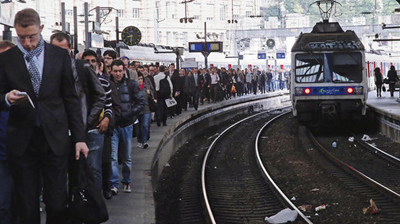法國鐵路罷工
Unhappiness is the truth
其實不快樂
A rerun of Francehs bad old days tests the Socialist government's resolve
法國艱難昔日的重演是社會主義政府決心的試金石
The long march to work
上班長征路
IT WAS a deliciously French moment of exasperation. On June 16th a railway strike prompted public rage when it threatened to disrupt a national philosophy exam. On the sixth day of a rolling strike, unions at the SNCF national railway encroached on the first day of the baccalauréat school-leaving exam, a ritual that begins with a four-hour philosophy essay. As strikers downed tools and commuters battled to work, some 340,000 French teenagers were wrestling with the question “Do we live in order to be happy?”
這是一個有趣的法國憤怒時刻。6月16號,當一次鐵路罷工影響到了全國性的哲學考試時,它觸犯了眾怒。在連續罷工的第六天,法國國營鐵路公司(SNCF)工會在中學畢業會考的首日開始了作亂,這一考試始于四小時的哲學論文。當罷工者停止工作,乘客奮力奔向公司時,約340,000名法國少年正在糾結:“我們活著是為了開心嗎?”

If Fran?ois Hollande had been sitting the exam, he would surely have answered: “Fat chance as long as there are rail unions around.” A strike originally expected to be short-lived was extended on June 18th into its ninth day, the worst industrial action since he became president in 2012. On some days, more than half of TGV fast trains have been cancelled, as well as two-thirds of certain commuter trains in the Paris region. The SNCF management called it the worst strike for 13 years.
如果弗朗索瓦·奧朗德參加了那場考試的話,他絕對會答道:“只要有鐵路公會存在,那就希望渺茫。”這一場原被認為會短命的罷工竟持續到了6月18號,已進行了九天,這是自奧朗德2012年當上總統以來發生的最嚴重的勞工行動。在某些日子里,超過一半的法國高速列車和約三分之二的巴黎通勤列車被取消了。法國國營鐵路公司管理部門稱之為13年來最嚴重的罷工。
The two unions behind it, the CGT, which is close to the Communist Party, and the even harder-talking SUD, are protesting against plans to merge two rail companies: the SNCF, which runs the trains, and RFF, the highly indebted firm that manages the tracks. After months of discussion, this reform went before parliament on June 17th. Nothing in the bill changes the special status of railway workers. But the unions suspect it will lead to changes in working practices and perks once the railways are opened up to competition in 2019.
幕后的兩個工會,親共黨的法國總工會(CGT)和更難協商的法國干部總工會(SUD)正在抗議合并兩家鐵路公司的計劃,這兩家公司分別是運營列車的法國國營鐵路公司(SNCF)和管理鐵路、負債累累的法國鐵路網公司(RFF)。經過數月的磋商后,這次改革于6月17號提交到了國會。法案中沒有改變鐵路工人特殊地位的條款,但工會懷疑一旦2019年鐵路公開競爭,這將導致工作實踐和津貼上的變化。
This conflict is the first big union-led test for Mr Hollande. Until now, the largest protest he has faced was over the legalisation of gay marriage. In fine tradition, he has booted the problem to his new prime minister, Manuel Valls, who has sounded tough, declaring that there is “no question” of shelving the reform. They are betting partly on union divisions to undermine the strike: Laurent Berger, leader of the CFDT, a big union which backs the reform, has accused those on strike of “contempt” for bac candidates. Mr Valls also has public opinion on his side. An overwhelming 76% say they oppose the strike. With the economy at a standstill and unemployment high, there is little sympathy for public-sector rail workers. The French are well aware that they get perks such as free tickets and that most train drivers retire at 50.
這次沖突是工會領導的第一次對奧朗德的大測試。直至目前,奧朗德面臨過的最大抗議是關于同性婚姻立法的。按照優良傳統,他將問題踢給了他的新首相曼紐爾·瓦爾斯。瓦爾斯聽起來口氣強硬,聲明擱置改革完全“沒問題”。他們將部分賭注放在了工會內部分裂、罷工漸漸停息上:支持改革的法國勞工民主聯合會(CFDT)領導人勞倫·柏杰指責罷工是對考生們的“蔑視”。瓦爾斯也贏得了大眾輿論,多達76%的人表示他們反對罷工。在經濟停滯、失業率居高不下的情況下,公共部門的鐵路工人難以獲取大眾同情。法國人很清楚鐵路工人們享受著免票等的特殊待遇,多數火車司機50歲就退休。
Yet the reason this strike has hardened goes beyond railway reform. Paradoxically, it partly reflects union weakness. Grass-roots members are frustrated that industrial action has lost much of its punch. The sort of paralysing strikes once common in France have become rare. By law, public services must run a minimum service during strikes, and days of industrial action are no longer paid. Between 2005 and 2011, the number of days lost to strikes per 1,000 employees fell from 164 to 77. On the SNCF works council, support for the CGT has dropped from 44% ten years ago to 36% today. Thierry Lepaon, the CGT leader, faces intense pressure not to give up the fight.
然而罷工愈演愈烈的原因已不僅僅是鐵路改革了。很自相矛盾的是,這在某種程度上反映了工會的弱點。草根成員對于勞工行動喪失了重大影響力而感到沮喪。這種曾在法國常見的癱瘓式罷工已變得鮮見。按照法律,在罷工期間,公共服務應提供基本的服務,勞工行動期間不發放工資。在2005年到2011年間,每1000雇員中將日子用在了罷工上的天數由164天降到了77天。在SNCF勞資委員會中,CGT的支持率由10年前的44%降到了今天的36%。CGT領導人蒂埃里·萊鮑面臨著巨大的壓力不能放棄抗爭。
The conflict also seems to have crystallised broader discontent with the government. Some strikers talk of anger over its new business-friendly policies and austerity plans. So do part-time theatre workers, who are protesting against benefit changes. Mr Valls can ill afford to let the chaos continue. But, billed as a bold reformer, neither can he be seen to give in to his first protest on the streets.
這場沖突似乎也更廣泛地具化了對政府的不滿。一些罷工者憤怒聲討新的招商引資政策和緊縮計劃。兼職戲劇工作者也在抗議著福利政策的變化。瓦爾斯無法承擔讓混亂繼續的局面。但被視為大膽改革家的他也不會屈服于第一次面臨的街頭抗議。譯者:王穎 校對:張丹












